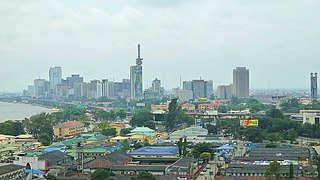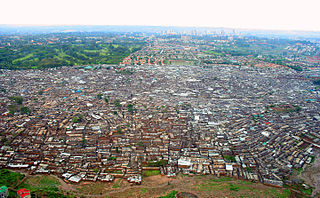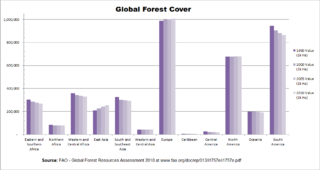Related Research Articles

Nigeria, officially the Federal Republic of Nigeria, is a sovereign country in West Africa bordering Niger in the north, Chad in the northeast, Cameroon in the east, and Benin in the west. Its southern coast is on the Gulf of Guinea in the Atlantic Ocean. It is a federal republic comprising 36 states and the Federal Capital Territory, where the capital, Abuja, is located. Lagos is the most populous city in the country and the African continent, as well as one of the largest metropolitan areas in the world.

Lagos is the most populous city in Nigeria and the African continent. Lagos is a major financial centre for all of Africa and is the economic hub of Lagos State. The megacity has the fourth-highest GDP in Africa and houses one of the largest and busiest seaports on the continent. It is one of the fastest growing cities in the world.

Land reform involves the changing of laws, regulations or customs regarding land ownership. Land reform may consist of a government-initiated or government-backed property redistribution, generally of agricultural land. Land reform can, therefore, refer to transfer of ownership from the more powerful to the less powerful, such as from a relatively small number of wealthy owners with extensive land holdings to individual ownership by those who work the land. Such transfers of ownership may be with or without compensation; compensation may vary from token amounts to the full value of the land.

The Kagera River, also known as Akagera River, or Alexandra Nile, is an East African river, forming part of the upper headwaters of the Nile and carrying water from its most distant source. With a total length of 597 km (371 mi) from it source located in Lake Rweru in Rwanda.

Poverty in Africa is the lack of provision to satisfy the basic human needs of certain people in Africa. African nations typically fall toward the bottom of any list measuring small size economic activity, such as income per capita or GDP per capita, despite a wealth of natural resources. In 2009, 22 of 24 nations identified as having "Low Human Development" on the United Nations' (UN) Human Development Index were in Sub-Saharan Africa. In 2006, 34 of the 50 nations on the UN list of least developed countries were in Africa. In many nations, GDP per capita is less than US$5200 per year, with the vast majority of the population living on much less. In addition, Africa's share of income has been consistently dropping over the past century by any measure. In 1820, the average European worker earned about three times what the average African did. Now, the average European earns twenty times what the average African does. Although GDP per capita incomes in Africa have also been steadily growing, measures are still far better in other parts of the world.
Michael Worsnip is a South African Anglican theologian. He is author of several books, most notably Between the Two Fires - the Anglican Church in South Africa 1948 -1957; the book Priest and Partisan: A South African journey on anti-Apartheid activist and fellow Anglican priest, Father Michael Lapsley; the Novel Remittance Man. He was formerly the Secretary General of the Lesotho Council of churches and was deported from South Africa after giving an interview to the BBC.
Agrarian reform can refer either, narrowly, to government-initiated or government-backed redistribution of agricultural land or, broadly, to an overall redirection of the agrarian system of the country, which often includes land reform measures. Agrarian reform can include credit measures, training, extension, land consolidations, etc. The World Bank evaluates agrarian reform using five dimensions: (1) stocks and market liberalization, (2) land reform, (3) agro-processing and input supply channels, (4) urban finance, (5) market institutions.

Agriculture in Nigeria is a branch of the economy in Nigeria, providing employment for about 35% of the population as of 2020. As reported by the FAO, agriculture remains the foundation of the Nigerian economy, despite the presence of oil in the country. It is the main source of livelihood for most Nigerians. The Agricultural sector is made up of four sub-sectors: Crop Production, Livestock, Forestry and Fishing. In the third quarter of 2019, the sector grew by 14.88% year-on-year in nominal terms with a decline of 3.44% points from the third quarter of 2018. The largest driver of the sector remains Crop Production as it accounts for 91.6% of the sector in the third quarter of 2019 with a quarterly growth which stood at 44.12%. The Agriculture sector contributed 29.25% to overall real GDP during the third quarter of 2019.
Eyitayo Lambo was appointed the Nigerian Federal Minister of Health in July 2003, holding office until May 2007 during the second term of the presidency of Olusegun Obasanjo.

Rail transport in Cameroon is primarily operated by Camrail, a subsidiary of Comazar.
The West African Senior School Certificate Examination (WASSCE) is a type of standardized test in West Africa. Students who pass the exam receive a certificate confirming their graduation from secondary education. It is administered by the West African Examinations Council (WAEC). It is only offered to candidates residing in Anglophone West African countries. The academic school-leaving qualification awarded upon successful completion of the exams is the West African Senior School Certificate.
An Eco-tariff, also known as an environmental tariff, is a trade barrier erected for the purpose of reducing pollution and improving the environment. These trade barriers may take the form of import or export taxes on products that have a large carbon footprint or are imported from countries with lax environmental regulations.

The Sunken Billions is a study jointly published in 2008 by the World Bank and by the Food and Agriculture Organization of the United Nations (FAO). The report shows that the difference between the potential and actual net economic benefits from marine fisheries is about USD 50 billion per year or some USD 2 trillion over the last three decades.

Rates and causes of deforestation vary from region to region around the world. In 2009, 2/3 of the world forests were in 10 top countries: 1) India, 2) Brazil, 3) Canada, 4) United States, 5) China, 6) Australia, 7) Congo, 8) Indonesia, 9) Peru and 10) Japan.

Stijn Claessens is a Dutch economist who currently serves as the Head of Financial Stability Policy department of the Bank for International Settlements. He worked for fourteen years at World Bank beginning in 1987 until 2001 where he assumed various positions including that of Lead Economist. Following his tenure at the World Bank he became Professor of International Finance Policy at the University of Amsterdam where he remained for three years and still is on the faculty. Stijn has many distinguished academic publications and his work has been cited in many outlets including The Wall Street Journal, The Financial Times, The Economist, The Washington Post and various other publications and he has appeared in several television programs.
Decree number 2004/320 is a presidential decree issued on December 8, 2004 by Paul Biya that organized 29 ministries of the Government of Cameroon.
The Business Environment and Enterprise Performance Survey (BEEPS) is an extensive economic survey undertaken as a joint initiative of the World Bank and the European Bank for Reconstruction and Development.

The World Bank is an international financial institution that provides loans and grants to the governments of low- and middle-income countries for the purpose of pursuing capital projects. It comprises two institutions: the International Bank for Reconstruction and Development (IBRD), and the International Development Association (IDA). The World Bank is a component of the World Bank Group.

Okra or Okro soup is prepared using the edible green seed pods of the okra flowering plant as a primary ingredient. It is greenish in colour. Okra has a slippery feel when rubbed with the fingers. The edible green seed pods can also be used in stews and soups.
Concentration of land ownership refers to the ownership of land in a particular area by a small number of people or organizations. It is sometimes defined as additional concentration beyond that which produces optimally efficient land use.
References
- ↑ Consensus, Confusion, and Controversy: Selected Land Reform Issues in Sub-Saharan Africa. World Bank Publications. 2006. p. 12. ISBN 978-0-8213-6441-3.
- ↑ "FACTSHEET: Who owns the land in Nigeria?". Africa Check. Retrieved 2020-04-23.
- ↑ Farvacque, Catherine; McAuslan, Patrick (1992). Reforming Urban Land Policies and Institutions in Developing Countries. World Bank Publications. p. 100. ISBN 978-0-8213-2092-1.